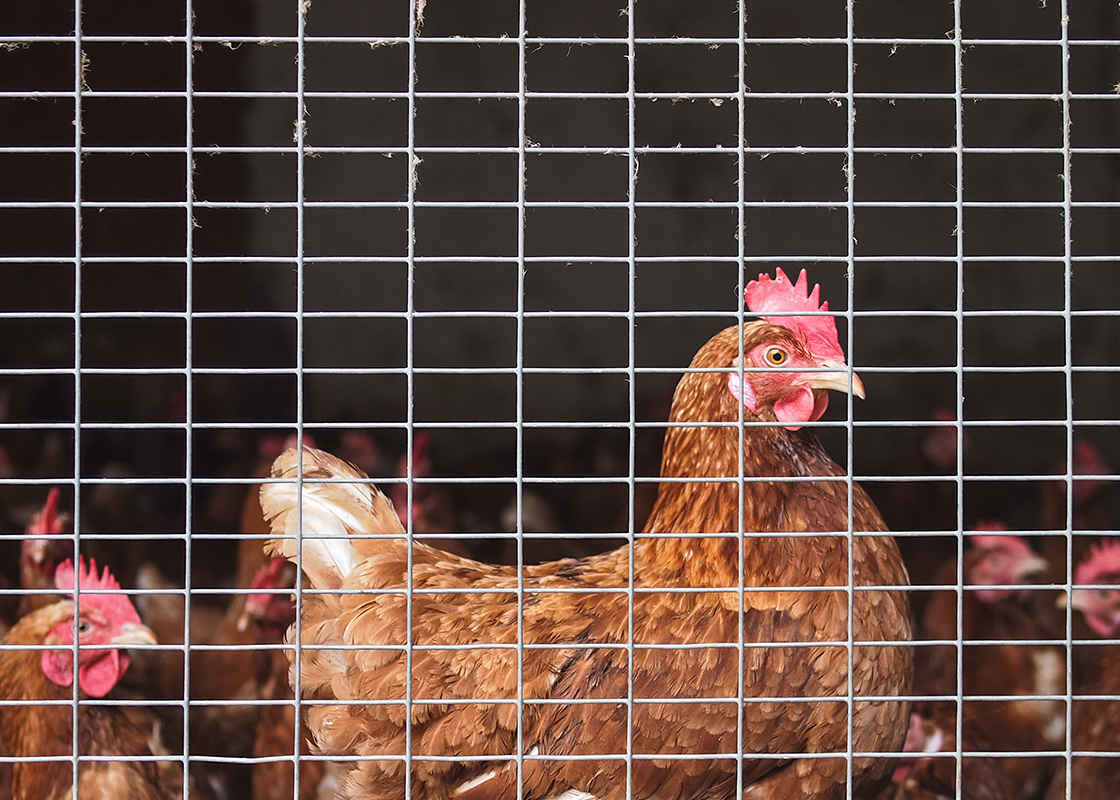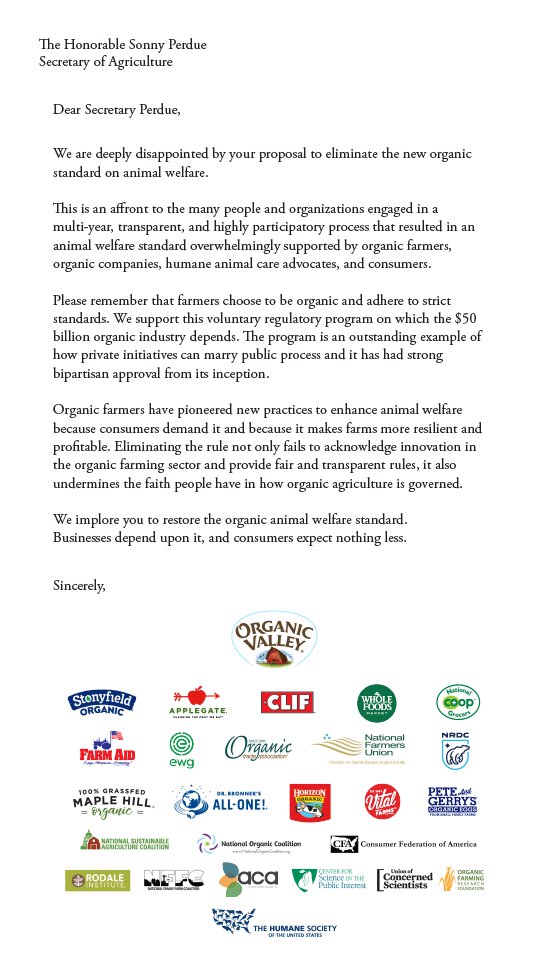Organic Valley, Whole Foods, and Others Blast USDA for Not Instituting Better Organic Regulations
When was the last time you saw an industry demand MORE regulation?
Organic Valley, Whole Foods, and Others Blast USDA for Not Instituting Better Organic Regulations
When was the last time you saw an industry demand MORE regulation?

The letter, which you can read here, attacks the Trump administration’s decision to nix the Organic Livestock and Poultry Practices rule (often called the OLPP rule), which was formed after several years of consultation and legislative work and was designed to clearly define guidelines for animal welfare in organic-certified products. “I’m sure we’re the only sector that voluntarily goes to DC and asks for more rules,” says George Siemon, CEO of Organic Valley, the company leading the charge.
Previous mentions of animal welfare in the organic regulations were vague and open to obfuscation; one of the best-known loopholes is the requirement to give egg-laying hens “access to the outdoors.” Without a firm description of what that terms means, some producers have created enclosed, screened-in porches, often on concrete – not even actual earth – to satisfy the rule. Sure, fresh air may flow in, but most common sense interpretations would say the hens remain indoors. (This particular example has provoked lawsuits, including a recent one filed against Walmart.)
Surveys indicate that consumers expect organic-badged food to come from animals raised in humane ways. It is not typical for any group to request more regulation, but organics, which represents a growing 4 percent of the total US food market, has a vested interest in producing food as ethically and responsibly as possible. “I think that might blow the president and his administration’s minds, because they’re very anti-new-rules, and we’re, on the other hand, saying ‘no, we want our label to represent every premium that the consumer is concerned about,'” says Siemon.
The fight against the OLPP comes primarily from large industrial agriculture and those associated with it (by, for example, taking political donations from those groups). Siemon believes their resistance isn’t merely about the organic label, but is designed to stop any animal rights legislation from getting a solid toehold. “The industrial livestock people always want to stop any animal welfare standards from entering the USDA,” he says.
Despite the setback in the discarding of the OLPP rules, Siemon remains optimistic about the future of responsible food production. “No matter what comes of all of this, I’m very confident that in the long run, organic eggs will represent access to the outdoors, because retailers and consumers are speaking to the issues now.” Consumer demand has driven major retailers to shift to cage-free eggs (as vague as that may be, it’s , and even some states are making up for what Siemon sees as a lack of vigor and speed on the part of the USDA. “A lot of these things are just sound animal husbandry rules,” he says. But the fact remains that retailers, producers, and local governments have had to pick up the slack from the USDA.
The letter was signed by many of the biggest names in food: Whole Foods, Stonyfield, Clif, Horizon, Vital Farms, Pete and Gerry’s, the Humane Society, the Union of Concerned Scientists, and more. The page on the Organic Valley website with the op-ed also directs those interested to a page where they can voice their opinions to the USDA.

Follow us
This work is licensed under a Creative Commons Attribution-NoDerivatives 4.0 International License.
Want to republish a Modern Farmer story?
We are happy for Modern Farmer stories to be shared, and encourage you to republish our articles for your audience. When doing so, we ask that you follow these guidelines:
Please credit us and our writers
For the author byline, please use “Author Name, Modern Farmer.” At the top of our stories, if on the web, please include this text and link: “This story was originally published by Modern Farmer.”
Please make sure to include a link back to either our home page or the article URL.
At the bottom of the story, please include the following text:
“Modern Farmer is a nonprofit initiative dedicated to raising awareness and catalyzing action at the intersection of food, agriculture, and society. Read more at <link>Modern Farmer</link>.”
Use our widget
We’d like to be able to track our stories, so we ask that if you republish our content, you do so using our widget (located on the left hand side of the article). The HTML code has a built-in tracker that tells us the data and domain where the story was published, as well as view counts.
Check the image requirements
It’s your responsibility to confirm you're licensed to republish images in our articles. Some images, such as those from commercial providers, don't allow their images to be republished without permission or payment. Copyright terms are generally listed in the image caption and attribution. You are welcome to omit our images or substitute with your own. Charts and interactive graphics follow the same rules.
Don’t change too much. Or, ask us first.
Articles must be republished in their entirety. It’s okay to change references to time (“today” to “yesterday”) or location (“Iowa City, IA” to “here”). But please keep everything else the same.
If you feel strongly that a more material edit needs to be made, get in touch with us at [email protected]. We’re happy to discuss it with the original author, but we must have prior approval for changes before publication.
Special cases
Extracts. You may run the first few lines or paragraphs of the article and then say: “Read the full article at Modern Farmer” with a link back to the original article.
Quotes. You may quote authors provided you include a link back to the article URL.
Translations. These require writer approval. To inquire about translation of a Modern Farmer article, contact us at [email protected]
Signed consent / copyright release forms. These are not required, provided you are following these guidelines.
Print. Articles can be republished in print under these same rules, with the exception that you do not need to include the links.
Tag us
When sharing the story on social media, please tag us using the following: - Twitter (@ModFarm) - Facebook (@ModernFarmerMedia) - Instagram (@modfarm)
Use our content respectfully
Modern Farmer is a nonprofit and as such we share our content for free and in good faith in order to reach new audiences. Respectfully,
No selling ads against our stories. It’s okay to put our stories on pages with ads.
Don’t republish our material wholesale, or automatically; you need to select stories to be republished individually.
You have no rights to sell, license, syndicate, or otherwise represent yourself as the authorized owner of our material to any third parties. This means that you cannot actively publish or submit our work for syndication to third party platforms or apps like Apple News or Google News. We understand that publishers cannot fully control when certain third parties automatically summarize or crawl content from publishers’ own sites.
Keep in touch
We want to hear from you if you love Modern Farmer content, have a collaboration idea, or anything else to share. As a nonprofit outlet, we work in service of our community and are always open to comments, feedback, and ideas. Contact us at [email protected].by Dan Nosowitz, Modern Farmer
January 17, 2018
Modern Farmer Weekly
Solutions Hub
Innovations, ideas and inspiration. Actionable solutions for a resilient food system.
ExploreExplore other topics
Share With Us
We want to hear from Modern Farmer readers who have thoughtful commentary, actionable solutions, or helpful ideas to share.
SubmitNecessary cookies are absolutely essential for the website to function properly. This category only includes cookies that ensures basic functionalities and security features of the website. These cookies do not store any personal information.
Any cookies that may not be particularly necessary for the website to function and are used specifically to collect user personal data via analytics, ads, other embedded contents are termed as non-necessary cookies.